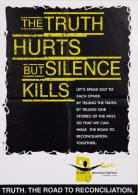On 15 April 1996, the Truth and Reconciliation Commission (TRC), under Chairman Archbishop Desmond Tutu, began its first formal hearings at the East London City Hall. Tomorrow will mark the 15th anniversary of this event, and 8 years since the TRC Final Report was tabled before Parliament - yet the legacy of the TRC continues to be suppressed by the Department of Justice and Constitutional Development (DOJCD).
The TRC process sought to advance the cause of reconciliation through truth recovery and transparency. The TRC collected large amounts of valuable information about the violation of human rights and the workings of the apartheid security establishment under apartheid. According to the TRC Final Report, the TRC records should be treated as 'a national asset ... to be protected and made accessible'.
SAHA has, since 2001, used South Africa's freedom of information legislation, the Promotion of Access to Information Act (PAIA), to test the extent to which the official TRC archive is accessible to the South African public. Despite recommendations of the TRC that these records should be made freely available to the public, the state has, over the past decade, repeatedly attempted to block SAHA's access to TRC records.
SAHA is currently engaged in a protracted battle with the DOJCD, to gain access to an anonymised copy of the TRC Victims Database. As stated in the TRC Final Report, this database of human rights violations under apartheid, compiled in the course of the TRC, "represents one of the most remarkable archival collections in the country and belongs to the nation". SAHA hopes to be able to make this database more widely accessible by publishing it online, in line with the practice of a number of other truth commissions around the world, for further statistical analysis, to complement and build on the work of the South African TRC.
In response to a PAIA request for access to the database, originally submitted by SAHA in 2006, the DOJCD sent correspondence to 22,000 South Africans whose personal information is stored in the database, erroneously claiming that SAHA had requested access to that personal data, depsite SAHA expressly stating that it did not want access to personal information. SAHA's access to information request was refused on grounds of privacy, demonstrating the DOJCD's basic lack of understanding of the PAIA request process, despite the DOJCD being the state's lead agency in the implementation of this key piece of constitutional legislation.
In 2009, SAHA re-submitted the request once more stating clearly that SAHA did not want access to victims' names, addresses and other identifying data. This request was also refused. Finally, in September 2009, the incoming Minister of Justice, Jeffrey Radebe, overturned previous refusals to release the TRC database to SAHA. After a long history of battles with DOJCD to obtain access to TRC records, SAHA had hoped that this decision by Minister Radebe represented a changing attitude to the right to access to information within DOJCD. However, in contravention of the Minister's instructions, the PAIA Unit of the DOJCD has failed, to date, to provide SAHA with a usable copy of the database.
The excuse most commonly proffered by the DOJCD for the failure is ‘technical difficulties' in redacting personal information from the database. SAHA, however, has secured offers from individuals involved in the design of the database to work with the DOJCD to undertake this apparently simple process, offers that have been repeatedly communicated to, and ignored by, the DOJCD. Most disconcertingly, the failure to provide access continues, despite SAHA having alerted the Minister himself to the failure of his subordinates to comply with his instructions.
The continuing willful obstruction by DOJCD in providing this essential tool to assist ongoing reconciliation work in the country has obliged SAHA to commemorate 15 April by submitting formal complaints to both the Public Protector and South African Human Rights Commission against DOJCD's unfair and improper conduct in this matter. It is hoped that their intervention will finally force DOJCD to fulfill the orders of Minister Radebe and act in accordance with the Batho Pele principles to which it purportedly subscribes by releasing a copy of the TRC database to SAHA, in line with the recommendations of the TRC.
For more information about SAHA's experiences attempting to access TRC records, please see:
Pigou, P. Accessing the Records of the Truth and Reconciliation Commission. In Allan, K (ed). 2009. Paper wars: access to information in South Africa.







